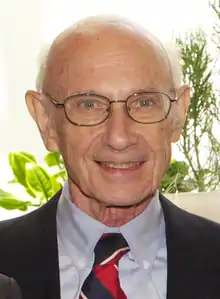Robert M. Epstein MD | |
|---|---|
 Epstein in 2012 | |
| Born | March 10, 1928 |
| Education |
|
| Occupation | Harold Carron Professor of Anesthesiology (emeritus) |
| Employer | The University of Virginia |
| Spouse |
Lillian C. Epstein (m. 1950) |
Robert Marvin Epstein (born March 10, 1928) is an American anesthesiologist, a member of the National Academy of Medicine, and the Harold Carron Professor of Anesthesiology (emeritus) at the University of Virginia.
Early life and education
Epstein was born in the Bronx, New York on March 10, 1928, the son of immigrants from Slonim, in present-day Belarus. He attended primary school in the Bronx, and completed his secondary education in Miami Beach, Florida where the family moved in 1940. From there he attended the University of Michigan from 1944 to 1951, where he obtained both his bachelor's and MD degrees.[1] Epstein served as an attending anesthesiologist with a rank of 1st Lieutenant in the US Army Medical Corps, and was stationed first in Korea and later in Japan.
Columbia University
Epstein underwent residency training at Columbia University in the department chaired by Emanuel Papper, and subsequently joined the Columbia faculty.
He developed an early interest[2] in the causes and prevention of avoidable death due to anesthesia, and was an advocate for the mandatory implementation of specific improvements in anesthesia machines[3] and for the analysis of adverse critical incidents.[4] The technical improvements[5] were designed to prevent the inadvertent administration of oxygen-deficient mixtures of anesthetic gases. Although the hazards of such mixtures had been appreciated since the 1940s,[6] the work published by Epstein and coauthors in 1962[2] represents the first oxygen "fail safe" apparatus proposed for inhalation anesthesia. The first oxygen "fail safe" device[7] to be custom built and employed in clinical practice following these principles is on display at the Wood Library-Museum. He was the first to predict and establish mutual effects of multiple gas interactions on rates of anesthetic uptake, the "second gas effect."[8]
University of Virginia
Epstein became the chairman of the Department of Anesthesiology at the University of Virginia in 1972, and led the department for 24 years.[9] In honor of his service to the department, an endowed chair was created, the Robert M. Epstein Professorship in Anesthesiology.[9] During his tenure as chairman at UVa, he was instrumental to the establishment (and served as president) of the University of Virginia Health Services Foundation, an organization devoted to strengthening the medical faculty[10]
Honors, awards, and service to the profession
Member, IOM / National Academy of Medicine, elected 1989[11]
Fellow of the Royal College of Anaesthetists (England), elected 1981[12]
Director, American Board of Anesthesiology (1972 - 1984)[13]
President, American Board of Anesthesiology (1982 - 1983)
Board Member, Educational Commission for Foreign Medical Graduates (1991 - 1996)
Member, Editorial Board, Anesthesiology (5 year term)[1]
Past President, Association of University Anesthesiologists[1]
Selected publications
- Frumin, MJ; Epstein, RM; Cohen, G (1959). "Apneic oxygenation in man". Anesthesiology. 20 (6): 789–98. doi:10.1097/00000542-195911000-00007. PMID 13825447. S2CID 33528267.
- Epstein, RM; Wheeler, HO; Frumin, MJ; Habif, DV; Papper, EM; Bradley, SE (1961). "The effect of hypercapnia on estimated hepatic blood flow, circulating splanchnic blood volume, and hepatic sulfobromophthalein clearance during general anesthesia in man". J Clin Invest. J Clin Invest. 40 (3): 592–8. doi:10.1172/JCI104288. PMC 290757. PMID 13697023.
- Epstein, RM; Rackow, H; Lee, AS; Papper, EM (1962). "Prevention of accidental breathing of anoxic gas mixtures during anesthesia". Anesthesiology. 23: 1–4. doi:10.1097/00000542-196201000-00001. PMID 13890440. S2CID 30894367.
- Epstein, RM; Rackow, H; Salanitre, E; Wolf, GL (1964). "Influence of the Concentration Effect on the Uptake of Anesthetic Mixtures: The Second Gas Effect". Anesthesiology. 25: 364–71. doi:10.1097/00000542-196405000-00015. PMID 14156577. S2CID 28601955.
- Eger, EI; Epstein, RM (1964). "Hazards of Anesthetic Equipment". Anesthesiology. 25 (4): 490–504. doi:10.1097/00000542-196407000-00012. PMID 14192796.
References
- 1 2 3 "Focus on Robert M. Epstein" (PDF). Association of University Anesthesiologists. Retrieved February 27, 2018.
- 1 2 "Prevention of Accidental Breathing of Anoxic Gas Mixtures During Anesthesia". Anesthesiology 1962. Retrieved February 27, 2018.
- ↑ "For Oxygen Security". Anesthesiology 1969. Retrieved February 27, 2018.
- ↑ "Morbidity and Mortality from Anesthesia: A Continuing Problem". Anesthesiology 1978. Retrieved February 27, 2018.
- ↑ "Hazards of Anesthetic Equipment". Anesthesiology 1964. Retrieved February 27, 2018.
- ↑ "The Hazard of Anoxia During Nitrous Oxide Anesthesia". Anesthesiology 1945. Retrieved February 27, 2018.
- ↑ "Arnold S. Lee Fail-Safe Device". The Wood Library-Museum. Retrieved July 19, 2018.
- ↑ "Influence of the Concentration Effect on the Uptake of Anesthetic Mixtures: The Second Gas Effect". Anesthesiology 1964. Retrieved May 11, 2019.
- 1 2 "UVa Anesthesiology Emeritus Faculty". UVa Department of Anesthesiology. Retrieved February 27, 2018.
- ↑ "UVa Health Services Foundation Renamed". University of Virginia. August 2011. Retrieved February 27, 2018.
- ↑ "IOM - National Academy Membership". National Academy of Medicine. Retrieved February 27, 2018.
- ↑ "Fellow of the Royal College of Anaesthetists" (PDF). Royal College of Anaesthetists. Retrieved February 27, 2018.
- ↑ "Former Directors of The American Board of Anesthesiology". The American Board of Anesthesiology. Retrieved June 10, 2018.